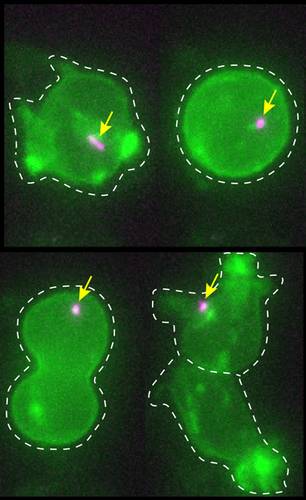
A neural progenitor cell extending a primary cilium (magenta, yellow arrow) undergoes cell division. A part of the cilium is retained in the cell throughout division and ultimately gets inherited by only one daughter cell. MPI-CBG, Dresden
Cells have small antennae which they use to receive signals. The primary cilium is such a sensory organelle, present in almost all cell types. Until now, the concept has been that the cilium is disassembled prior to mitosis, to liberate the centrosomes and distribute the cilium among the two daughter cells. Researchers at the Max Planck Institute of Molecular Cell Biology and Genetics (MPI-CBG) in Dresden now show in neural stem cells and cultured cells that something totally different is happening: the cilium remains connected to one of the two centrosomes during cell division and is inherited by one of the daughter cells. "This means that this chapter in the textbooks has to be rewritten," says Wieland Huttner, director and research group leader at the MPI-CBG.
Like so often in science, the discovery was built on coincidence: "I was looking for something else, when I saw some remains of ciliary membrane in a cell," Judith Paridaen remembers. And that prior to a cell division - according to textbooks, the cilium is supposed to be disassembled in order to allow the mitotic spindledo its work properly. The postdoc in Wieland Huttner's group marked the cilium with a fluorescent protein and observed it in all stages of cell division. "I could see the membrane of the cilium all the time, and eventually even saw how it was inherited by one of the two daughter cells ," says Paridaen.
The inherited ciliary membrane helps the daughter cell to maintain its stem cell character. Also, it will regrow a fully functional cilium within only one hour. "So this daughter cell has the edge over the other daughter cell, or in other words: this introduces asymmetry between the sister cells," explains Paridaen .
The new insights have no clear translational potential, no therapeutic use seems to be related - it is new knowledge. Wieland Huttner: "After all, cell division is a fundamental process in biology, and we could show that it happens not the way it was thought to happen but completely differently".
Judith Paridaen, Michaela Wilsch-Bräuninger, Wieland Huttner:
Asymmetric inheritance of centrosome-associated primary cilium membrane directs ciliogenesis after cell division
Cell, 10 October 2013